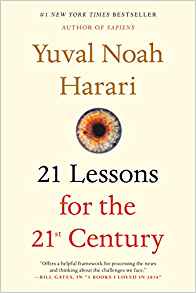 Yuval Noah Harari, 21 Lessons for the 21st Century (New York: Spiegel and Grau, 2018), 372pp.
Yuval Noah Harari, 21 Lessons for the 21st Century (New York: Spiegel and Grau, 2018), 372pp.
Yuval Noah Harari (born 1976), an Israeli historian and professor at the Hebrew University in Jerusalem, is one of those writers who has become so wildly successful that he now faces the challenge that anything he writes will be published. In his book Sapiens: A Brief History of Humankind (2014 in English), Harari explored our human past. In Homo Deus: A Brief History of Tomorrow (2017 in English), he pondered our future. These two books have sold over 12 million copies and been translated into forty-five languages.
His newest tome zooms in on our here and now. What is happening right now on our planet as a whole? And what is the deep meaning of these events? The "biggest challenges our species has ever encountered," he says, are information technology and biotechnology. Think of artificial intelligence, big data, the pervasive power of algorithms, and genetic engineering. Now factor in environmental collapse. In the past we have had big "stories" like communism, fascism, and western liberalism, but in Harari's view all of these explanatory frameworks are finished. Today we face what he calls a "nihilist moment" as we search for a new story.
Harari's book reads like a disjointed collection of previously published essays that have been reworked and then only loosely stitched together (see pages 326–327). For example, there's a chapter called "Religion" and another one called "God" that are separated by seventy-five pages and four other chapters on immigration, terrorism, war, and humility (all the chapter titles are just one word).
All these "21 Lessons" display Harari's encyclopedic learning, and his interest in macro-level interpretations ("my agenda is global"), but given the format they glide along the surface. One reviewer noted his "grandiloquent sweeping generalizations." He's very dismissive of religion, for example, as an "elaborate fiction" that is based on the "flimsiest foundations." Monotheism was "one of the worst ideas in human history." Religion, he says, is no match for science, economics, and technology. The "secular ideal," by contrast, has a "commitment to the truth, which is based on observation and evidence rather than on mere faith."
At the end of the book, Harari offers no new alternative Story. His response to our nihilist moment of biotech disruption is to commend personal meditation, which he discovered at the age of twenty-four when he took a ten-day Vipassana retreat while at Oxford. Today he meditates for two hours every day, and each year he takes a longer retreat of a month or two. He's a vegan and does not own a cell phone. He lives with his husband on a moshav or cooperative agricultural community near Jerusalem. The subtitle of his last chapter called "Meditation" is "just observe." But are breathing techniques a meaningful response to biotech?
Harari might be "bold and breezy" as one British critic put it, but he's still a "rollicking good read."
Dan Clendenin: dan@journeywithjesus.net


